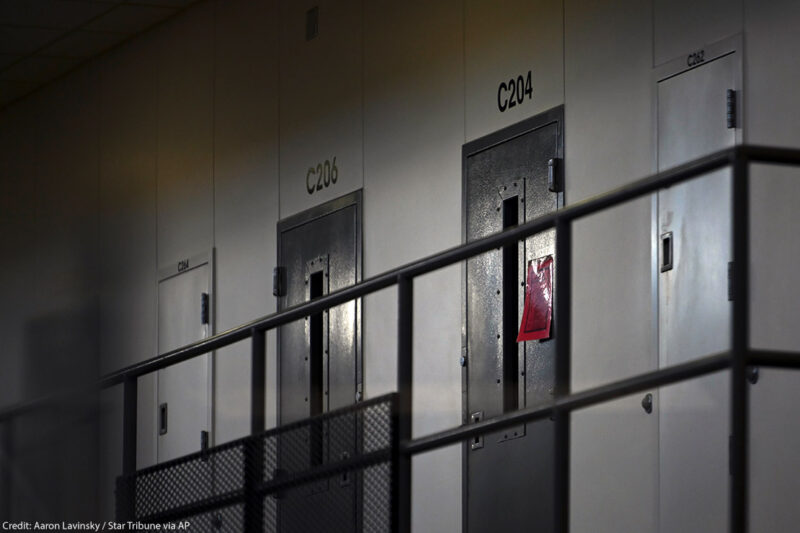The Expiration of the CARES Act Could Force Thousands Back into Federal Prisons


The Trump Department of Justice spent its final days putting thousands of people at greater risk of catching COVID-19 during the height of the pandemic. On Jan. 15, the DOJ’s Office of Legal Counsel issued a memo arguing the Bureau of Prisons (BOP) will be legally obligated to return thousands of people released on home confinement back to federal prisons while the pandemic still ravages correctional facilities. With the memo’s March return date growing closer — and public health officials indicating that we will not be out of the pandemic woods by then — the Biden administration must take swift action. Not only must the administration ensure that those who have been released can stay out of these deadly facilities, they must also expand the program by increasing the number of people released to home confinement, the use of clemency, and the commutation of sentences.
When Congress passed the Coronavirus Aid, Relief, and Economic Security Act, or CARES Act, last March, it included a mandate to decrease federal incarceration to stop the spread of the virus. The Trump administration, however, dragged its feet in response, creating complex and changing guidelines for consideration for release, making entire groups of people ineligible for release due to their convictions and/or criminal history, regardless of their health status, and even arguing that some people would be safer in federal prisons.
However, with mounting pressure from Congress, federal public defenders, and advocacy organizations, more than 7,000 people have been sent to home confinement. While this is only a small portion of people in federal prisons, any decrease in prison population is vital given the increased dangers of incarceration during a pandemic.
In spite of these risks, the DOJ’s Office of Legal Counsel’s Jan. 15 memo argued that home confinement should end for those 7,000 people when the CARES Act runs out in March. The memo claimed that these releases can occur “only during the Act’s covered emergency period,” and the BOP’s authority “does not provide an alternative basis for authorizing continued home confinement.” This is wrong as a matter of both law and morality. In terms of law, home confinement is a standard practice in federal prisons that predates the COVID-19 pandemic. The BOP had this authority long before the CARES Act, most recently updating its standards in 2019. People are only pulled back into facilities from home confinement if they have violated the rules of the program. There is nothing in the CARES Act that changes this procedure, and the act doesn’t provide its own grounds for recall from home confinement. In terms of morality, decreasing the BOP’s population will save lives, both of those inside of federal prisons and those outside of them.
People in prisons, jails, and detention centers have been among those hit hardest by the pandemic. As of December, one in every five people in state and federal prisons in the United States has tested positive for the coronavirus. This rate is more than four times as high as in the general population, and the limited data available for the BOP suggests the rate is even worse for people in those facilities. These shocking rates are likely an understatement of the true scope. ACLU lawsuits against local jails, state and federal prisons, and federal detention facilities have repeatedly demanded more testing, along with increased releases and improved health care. At least 2,305 incarcerated people and 145 corrections staff have already died from COVID-19, a horrific and unacceptable death toll.
Outbreaks in these facilities also endanger other members of the communities they are located in, as staff carry the virus with them in and out of work. Studies in Chicago and Milwaukee have empirically shown what we already know: Every member of our communities must be protected to ensure the end of this pandemic. Releasing people from these prisons and jails is a vital tool to fight COVID-19. It not only puts those released in a safer situation, it also allows people who are still inside to more easily socially distance, reducing the risk for everyone at the facility and in the surrounding area.
The Biden administration must take swift action not only to make sure the people who are out on home confinement can stay out, but also to ensure more people can be released from federal facilities. Committing to no longer use private prisons was a great first step toward changing the federal prison system, but no prison, jail, or detention center is safe during a pandemic.
We know fighting COVID-19 is a top priority for the Biden administration, and stopping the virus in the places it’s spreading most rapidly and dangerously is a critical public health approach. The Biden administration, therefore, shouldn’t just ensure the reversal of the Trump administration’s vindictive policies by rescinding the policies in Trump’s memo — it must use its power to release more people to home confinement, and use compassionate release and clemency to save lives. It makes sense for the thousands of people in danger in those facilities and for finally ending this pandemic.

